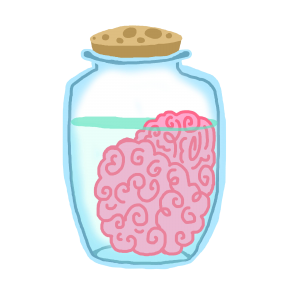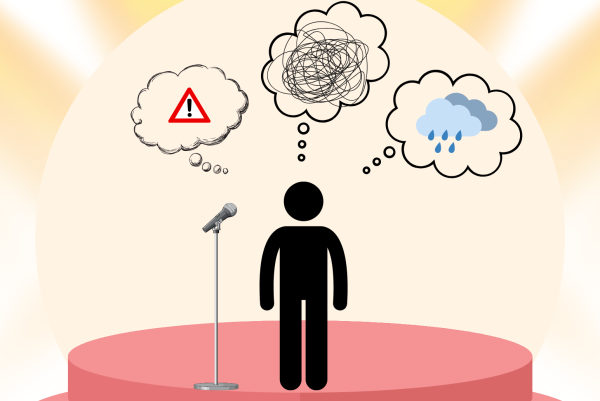Column: Ending the stigma around of mental health in the Latino community

An art piece including me depicting mental illness. The work shows that someone may seem fine and not say anything, but internally they could have a range of emotions, making it hard to contain and fully function. Photo illustration by Miaya South ’19.
Last month, Mental Health Club, Honor Education Council and Best Buddies led a Community Connections that drove me to reflect on mental health awareness in our culture. The presentation discussed loosely used derogatory terms regarding mental health conditions and educating ourselves and our communities. As I listened, I thought about how every day I see more discussion about mental health — whether it’s in social media, conversations with my friends or articles in the news. That’s when a devastating thought dawned on me: a stigma around mental health still haunts Latino households.
Statistics from the National Alliance on Mental Illness state that “only 20 percent of Latinos with symptoms of a psychological disorder talk to a doctor about their concerns. Only 10 percent contact a mental health specialist” — but seeking help is about 60 percent more likely in white communities. This fear of seeking assistance in Latino communities comes from deeply rooted cultural and socioeconomic factors, which much of the Latino population is unaware of.
I have seen first hand the shame around seeking psychological help in the Latino community. All humans have a reluctance to seek help. According to CNN, “less than one-third of the estimated 18 million American adults who have a mental illness that affects their day-to-day functioning receive treatment.” However, the Latino community creates another barrier from finding help. The topic of mental illness in Latino communities is generally labeled “loco” or “crazy” and the importance of seeking assistance is devalued. Mental illnesses are commonly said to be an “exaggeration” of the common blues or turned into a joke.
My close friend Angelica Gonzalez ‘20 describes the stigma as something that “dehumanizes people with mental health issues and isolates them. It makes them think like there is something wrong with them and can delay the process of getting help, making the process harder for them.”
Many Latinos are not educated on mental illness and its complexity, resulting in this false definition. Many are not aware of symptoms or signs, how it can affect someone or where to find help. It is a conversation that is often avoided and rarely spoken about in the Latino culture. There’s often a hesitation to speak about family issues in public in order to guard privacy or to deny something Latinos don’t want to believe exists.
All these factors discourage speaking up or calling for help. Latinos who suffer from mental illness may fear backlash, not being understood or of being negatively labeled. Those affected already deal with the overwhelming experience of coming to terms with their own mental illness; facing the negative connotations created in the Latino community just makes a difficult situation worse.
There is also a pressure of being strong and independent in the Latino community, not only when it comes to seeking treatment but also in other situations. I have felt it myself in certain instances because there is an expectation that you should be able to overcome anything that comes your way and that any problems you bring up would weigh down your family.
There are also more economical obstacles that present themselves to Latinos when seeking treatment, such as not having insurance or legal immigration status. Immigrant families may not seek help out of fear of deportation. Even children of undocumented immigrants, who are eligible for health insurance, typically do not apply for it out of this fear.
These stigmas, added to the topic of mental health, put Latinos at a disadvantage, which is harmful and problematic. Without receiving the proper attention, mental health conditions can worsen and deny someone a fulfilled life. Untreated mental illness can worsen an manifest in substance abuse or suicidal thoughts. The Center for Disease Control and Prevention show that “18.9 percent of Hispanic students have seriously considered suicide, and 11.3 percent have attempted suicide”.
Being in a Latino family, I know how real and detrimental these issues really are. I remember having a cousin who really felt like she needed to see a therapist as she went through a rough patch. I remember her telling me about how scary the thought of telling her parents was, or how she didn’t trust her school counselor. She felt alone, helpless and, with every passing day, she grew more anxious and afraid.
This all originates in one source: lack of education. Younger generations in Latino families should educate the people around them on the topic of mental health. People need to be taught about accepting those with mental health disorders, the usage of offense terms, what opportunities are available to them and how complex the mental health is.

Celeste Ramirez joined the Oracle as a columnist in 2017 and is now the Multimedia Editor. Her column focuses on diversity at Archer, highlighting the...








